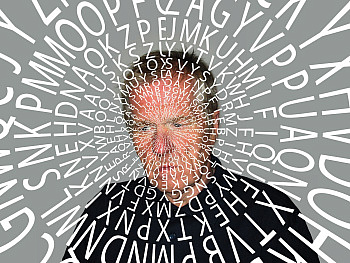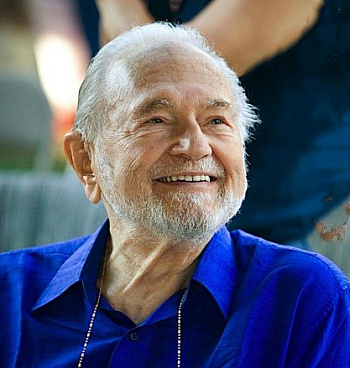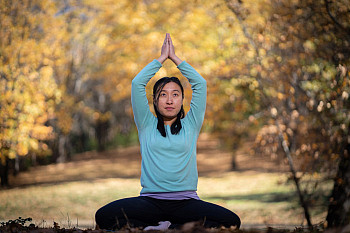One of my constant sources of inspiration is Living Wisely, Living Well, a wonderful compilation of insights for each day of the year by Swami Kriyananda. A few months ago, on the morning of my birthday, I enthusiastically opened the book to see what message Swamiji might have for me. I was determined to apply that thought in my life. The thought for that day was simple to understand but alas, not so easy to implement:
To develop concentration, do one thing at a time, and do it well!
Scattered attention
I started reminiscing about my days in the corporate world as I thought about this statement, where multi-tasking is often deemed as highly desirable. Job profiles would mention, ‘We want a person who can work on many projects at the same time.’
It is considered normal to be on a Zoom call while checking the email inbox and eating lunch at the same time. It was hard to get someone’s undivided attention. Before you know it, they have their phones in their hands and are peeking at emails and message inboxes. I can’t, however, blame others — I, too, was guilty of the same thing!
 I found with just a little research that I wasn’t alone. Studies show that, on average, an office worker will check their email inbox 30 times every hour. The average human now has an attention span of just 8.25 seconds – 4.25 seconds less than in 2000. I wondered, with such distracted minds, how can anyone achieve anything?
I found with just a little research that I wasn’t alone. Studies show that, on average, an office worker will check their email inbox 30 times every hour. The average human now has an attention span of just 8.25 seconds – 4.25 seconds less than in 2000. I wondered, with such distracted minds, how can anyone achieve anything?
Excelling with focus
Swami Kriyananda, a direct disciple of Paramhansa Yogananda and founder of Ananda Sangha, was a man of many abilities. Not only was he a highly evolved and advanced yogi, but he was also an accomplished musician, writer, singer, community leader, administrator, counselor, lecturer, linguist, designer, and architect (forgive me, Swamiji, if I missed something). In short, he was a modern polymath.
What helped Swamiji excel in everything was his undivided attention to the task in front of him. He once commented that most multi-talented people are not able to develop their talents fully because their energy is always divided.

Swami Kriyananda
Swamiji wrote 150 books and over 400 pieces of music. The secret of his enormous creative output was simply doing one thing at a time. When he would concentrate on a task, he gave his complete attention to it and put out of his mind any other reality.
“When I write books,” he said, “I can’t even imagine how I could ever write music. When I’m writing music, I can’t remember how to write books.” Once Nayaswami Devi was visiting Swami Kriyananda when he was working on his Oratorio, based on the life of Christ and recounts:
“When Swamiji was working on the Oratorio, even when he was with people, his mind never left the music. He was always gracious, but you could see it was difficult for him to relate to us. I felt he had to translate words into melody before they made sense to him. Sometimes I think he couldn’t remember my name, but tried to identify me by deciding which key I was in: B flat? G minor?”
Energy and flow
Swamiji would often say that it doesn’t take time to do things, it takes energy. You can think of it as a simple equation: Work Done = Time Spent x Intensity of Concentration. The better your concentration, the quicker you will get things done.
Thankfully, getting things done is not the only incentive for us to improve our concentration abilities. When we are in a deep state of concentration, we enhance our creative and intuitive powers, and feel a sense of joy, even in the midst of activity.
Psychologists refer to this deep state of absorption as the state of flow.Psychologists refer to this deep state of absorption as the state of flow. Athletes who enter such a state describe how everything slows down, they just know the right decision to be made, and they see nothing else but their goal. Writers, comedians, and other creatives who enter this state, share how ideas and insights seemingly come out of nowhere.
The ability to concentrate deeply gives us mastery over our awareness. That mastery brings us joy. Mihaly Csikszentmihalyi author of the book Flow, found that no matter what people did, as long as they entered this deep state of absorption, they found fulfillment and meaning in their work.
I notice that I feel more alive, joyful, and relaxed when I focus on one thing at a time, as opposed to frantically switching between the tasks on my to-do list. I realized that multitasking creates a deceptive feeling of efficiency. One merely feels that one is getting more things done, but actually ends up doing nothing well.
Any violent or prolonged excitement disturbs the flow of life force through the nervous system. If you put a two-thousand-volt current through a fifty-watt lamp, it will burn out the lamp. In the same way, excessive stimulation burns the nerves, cutting off the supply of energy and upsetting the functioning of the nervous system. –Paramhansa Yogananda
When we try to divide our energy between different projects, we merely get excited and think that we are doing so much! In my experience, at the end of such a distracted day, I always find myself exhausted. However, when I concentrate and take every task to its completion, I feel more satisfied, content, and energetic to move on to the next thing.
Meditation concentration

In meditation also, concentration is one of the most essential ingredients to success. In fact, Yogananda described meditation as “concentration on God or one of His aspects.” At the same time, the first obstacle that beginner meditators often share with me is, “The mind gets distracted so easily! How can I develop concentration?”
The answer is simple – practice concentration in everything you do. Because training our concentration is a 24/7 job. Concentration is not practiced only when you meditate. It’s also practiced when you’re filling out a form, writing a report, sitting in a meeting, talking with a friend, making tea, or driving your car. Are you giving your full attention to everything you do? Or are you letting your mind drift away?
I have been learning how to play the Indian bamboo flute. Just like any new skill, it takes sustained application of energy to perfect the technique. As a result, my teacher has me play the same (long!) scale sometimes as much as 100 times every day. I often get tired and/or frustrated in the process. But I gradually realized that, more than anything, it’s helping me to train and develop my powers of concentration. The better I can concentrate, the better I can play the flute, write this article, or dive deeper into meditation.
Swami Kriyananda, with one simple statement, has given us the essence of success, whether material or spiritual. I invite you to experiment and have fun with this all-important concept that will help you to pursue and find excellence in all that you do.
![]()

3 Comments
A beautiful blog 🌹Shivendra
So true “one task at a time”
So unlike multinationals where if you can’t multi task you are failure ..
But ultimately it’s the depth and not the breadth that matters.
Thankyou Shivendra keep blogging and inspiring us …
Will u pls guide me, how can i join online Yoga session
Beautiful blog, Shivendra!